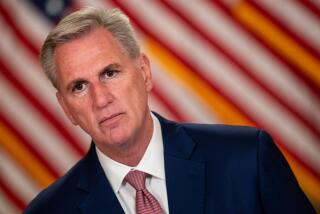Out-of-Kilter Budget
President Bush was repeating Washington’s new mantra Wednesday as he began selling his $1.96-trillion federal budget and $1.6-trillion, 10-year tax cut across the country. “The surplus is your money, not the government’s money.” But we Americans are the government. We elect our president and congressional representatives to determine the nation’s needs and raise the money required to finance those needs.
Both during the election campaign and now, Bush put his own twist on his words about whose money it is. That’s politics, of course. But in effect he’s saying, “We now have more money on hand than we have been spending, so we must have been spending too much.” Even if there’s logic there, the details of Bush’s first budget should get close examination. Do middle-class voters really want a little money back instead of making a dent in the tens of millions of uninsured people? Instead of more ample natural resource protection? These are choices that deserve more discussion.
Education, the No. 1 voter priority, gets the largest proportional increase, 11.5% over last year. That comes to an additional $4.6 billion, money that can hardly be quarreled with.
Concern for health care, both for the elderly and uninsured, also figured prominently in Bush’s Tuesday night address to Congress but did not fare so well in the specifics. Budget documents issued Wednesday reserved their most detailed plans and numbers for a small piece of the health care pie--substantial and merited increases for the National Institutes of Health.
For the nation’s more than 40 million uninsured people, Bush calls for a refundable tax credit of unspecified size--about $1,000 a year according to previous estimates, a paltry fraction of the cost of a health insurance policy. Bush would also expand community health clinics. But this is a Band-Aid on the nation’s largest single health problem, one that requires much larger thinking than Bush has applied and one for which the private market offers no solution.
By definition, budgeting is a matter of setting priorities and allocating dollars. But in the case of the federal government it also is political, designed to persuade the public that the president’s priorities are the correct ones.
Overall, Bush’s plan is relatively conservative, seeking to hold growth in discretionary spending to 4% over present levels, even with revenue increasing much faster. And since some areas of the budget, such as education, get much larger increases, 10 other departments must absorb cuts to reach the 4% goal. For instance, the Department of Agriculture loses 7.7% and Transportation is down 11.4%. How are priorities being allocated in those areas? Will there be reductions in farm subsidies? Less highway or airport construction? We won’t really know until more budget details are released in April.
There were welcome proposals scattered throughout Bush’s address and his budget document. One was his request to Atty. Gen. John Ashcroft for a program to end racial profiling by police departments. Bush also said he would fully finance the Land and Water Conservation Fund for parks and wild land purchased by federal, state and local governments, for cleaning up contaminated “brownfields” and for spending more on national park infrastructure--another popular issue, although in many places the greatest need is more protection of the natural resources themselves.
It is difficult to find a philosophical direction in Bush’s program. In the end, the compass keeps pointing to the tax cut, which would benefit the wealthy far ahead of all others. Bush insists that in proposing revisions he didn’t pick his tax brackets at random or set them arbitrarily; he explains that 33% was chosen as the top bracket, down from 39%, because people shouldn’t have to pay more than a third of their income in federal taxes. That sounds fairly arbitrary. In considering next year’s spending, Congress should put the budget back in the proper order: needs first, then figure tax cuts.
More to Read
Get the L.A. Times Politics newsletter
Deeply reported insights into legislation, politics and policy from Sacramento, Washington and beyond. In your inbox three times per week.
You may occasionally receive promotional content from the Los Angeles Times.










